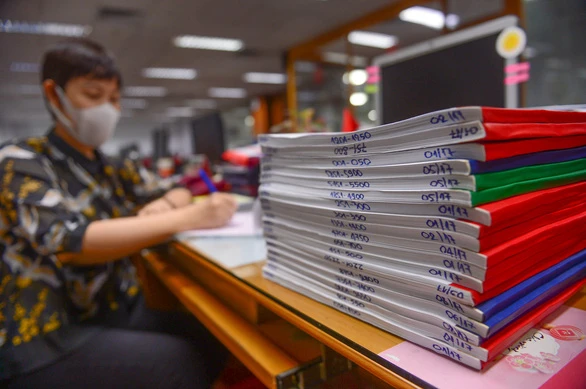
Huge price hike
Ms Ly Kim Chi, Chairwoman of the Food and Foodstuff Association (FFA) of Ho Chi Minh City, said that businesses bent over backwards to provide sufficient goods and did not raise the prices during the hardest months of the Covid-19 pandemic wave, despite increasing pressure of rising prices of raw materials. Particularly, raw materials for manufacturing activities escalated by more than 20%. The stock inventory allowed companies to cope with the situation throughout. Now, the inventory is running out while companies badly need raw material to increase production to meet a greater demand for products for year-end season and New Year holidays. Yet there is no sign of prices of raw materials decreasing any time soon.
For instance, the price of imported wheat flour has risen by 20%, and prices of flavor have also climbed. Worse still, the price of fuel has continually increased, causing the price of transport and other services to go up. The price spike is making it extremely hard for companies in the food sector to continue to operate successfully. The price of essential food items could therefore rise by about 10%.
Similarly, other sectors like footwear, plastic and textiles are also faced with huge pressure because of increasing prices of raw materials, especially imported ones. The problem has been mainly caused by the Covid-19 pandemic, which has been seriously affecting production activities in different countries, including China, from where large quantities of major raw materials are imported for production in Vietnam.
Figures from the General Statistics Office of Vietnam show that China has been the biggest market from which Vietnamese companies imported materials and products over the last ten months of 2021, with a turnover of USD 89.4 bn, which is a 36.4% year-on-year increase. The Vietnam Leather Footwear and Handbag Industry said the cost of inputs, including imported raw materials, has been soaring because China has been hit hard by the Covid-19 pandemic and the logistics costs have also gone up. The input costs have been escalating while the outsourcing prices have remained almost unchanged due to the fact that many other countries have been affected by the pandemic and consumers are not being extravagant in their spending.
Although the Vietnamese plastic sector has not been heavily dependent on raw materials from China because there are other sources such as from Thailand, the Republic of South Korea or Middle East countries. Ms. Huynh Thi My, General Secretary of the Vietnam Plastic Association, said the plastic sector is struggling with lots of problems caused by increasing price of raw materials worldwide. The price of imported raw materials and accessories has been skyrocketing, with some items like PVC soaring by upto 30%. Additionally, delivery of products from the Middle East used to take between 45 and 60 days, but it could now take a few more extra weeks. Ms. My said that the input costs have soared, but companies have hardly raised the output prices in an effort to retain their customers, which has reduced profits even though sales have increased.
Some people may ask if it is possible to make good use of domestic raw materials to reduce the input costs, but this is still impossible for the plastic sector. The domestic raw materials can meet only about 20% of the demand, and their quality is still a problem. Also, price rise has been a common trend, and price of raw materials in the country have been on an increase too. If there is some good news about domestic raw materials, it is lower cost and shorter transportation time. In fact, the increase in price of raw materials did not happen a short time ago. It actually started in early 2021 and there is no sign of it coming to a halt. It is obvious that the fourth wave of the Covid-19 pandemic over the last few months and the current price hike have made companies struggle immensely.
Decline in purchase power
Companies in the manufacturing sector have to struggle with input costs, but they are still able to speed up production to meet orders, especially those for the shopping season during year-end holidays. Several other items have not seen any signs of recovery in the domestic market. Speaking to Saigon Investment, Mr. Pham Quanh Anh, CEO of Dony Garment Company, said that the fashion segment has not made a recovery. Dony has two main manufacturing segments for domestic and international services. In the export segment, Dony has completed all old orders and has signed several new big export contracts with clients from Japan, the USA and the Middle East. In contrast, business is rather slow in the domestic market. Dony has received few orders for uniforms as well as outsourcing orders from fashion companies. At this time every year, most garment companies are very busy with orders for products for year-end holiday season, but factories are still running very slow.
Several sectors are seriously concerned about a decline in purchasing power, even for essential goods. The shopping season is coming right after consumers suffered a long period of social distancing which has certainly caused some changes in consumer behavior. Ms. Nguyen Phuong Nga, representative of Kantar Vietnam Company Limited specializing in market research, said that the pandemic has seriously affected consumer jobs, thereby influencing shopping habits. The consumer will still celebrate the Vietnamese traditional Tet holiday, but their family meals could be on a smaller scale. These changes will affect the way to stock food and drinks for Tet as well as shopping habits during the Tet holidays.
In order to stimulate consumer interest, especially as the year draws to an end, Ho Chi Minh City authorities will launch promotional programs, with a focus between the time from 15 November until 31 December. The program, steered by the People's Committee of Ho Chi Minh City, will offer promotional rates of upto 100%, both online and offline. Promotional offers will be provided by businesses in Ho Chi Minh City. The Department of Industry and Trade in Ho Chi Minh City expects that the stimulus campaign will encourage consumers to buy lots of products, thereby contributing significantly to the recovery of production and business activities.
Moreover, the Department of Industry and Trade is suggesting that Ho Chi Minh City authorities should launch promotional programs twice a year in the years to come so that positive shopping habits are developed among consumers.




















